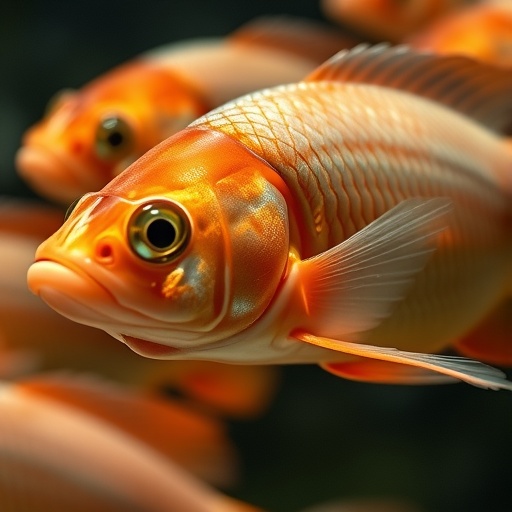In a groundbreaking study, researchers have uncovered a significant link between abiotic stressors and the prevalence of saprolegniasis infections, which have been wreaking havoc on populations of two commercially important fish species: Pangasianodon hypophthalmus, commonly known as the Mekong giant catfish, and Labeo rohita, also referred to as the rohu. This revelation has profound implications for aquaculture practices, particularly in the eastern regions of India where these species are intensively farmed. The research highlights how external environmental stresses not only impact fish health but can also lead to catastrophic mortality rates in aquaculture setups.
Saprolegniasis, caused by the water mold Saprolegnia, has emerged as a considerable threat in aquaculture systems, with conditions created by abiotic stressors fostering the perfect environment for these pathogens. The study, part of an ongoing investigation into fish health management, seeks to unravel the complexities of how environmental changes contribute to disease susceptibility. The researchers emphasized that understanding the interplay between abiotic factors and pathogenic infections is crucial in developing sustainable aquaculture systems that can withstand climatic variations.
As climate change accelerates, fish farming practices face increased pressure from various abiotic factors including temperature fluctuations, salinity changes, and oxygen depletion. This research identifies these as key contributors to the increase in susceptibility to saprolegniasis. Elevated water temperatures, which often accompany climate change, can significantly alter the metabolic rates of fish, making them more vulnerable to infections. Fish under stress may exhibit weakened immune responses, prompting a domino effect that can devastate entire populations.
Across the studied regions in Eastern India, incidents of mass fish mortality have been reported, raising alarming questions about aquaculture sustainability. The study found that under conditions of high stress, such as overcrowding and inadequate water quality, the likelihood of saprolegniasis outbreaks increased dramatically. Consequently, with fish populations already straining under these stresses, the introduction of pathogens like Saprolegnia could lead to mass die-offs, jeopardizing the livelihoods of local fish farmers.
The implications of these findings extend beyond mere statistics; they affect the socio-economic stability of communities dependent on aquaculture. With Pangasianodon hypophthalmus and Labeo rohita being two vital sources of protein and income in the region, understanding their susceptibility to infections fueled by abiotic stressors has become essential. The research calls for immediate action from policy-makers and fish farming professionals alike to adapt management practices and mitigate these risks.
Preventive measures suggested by the researchers include improving water quality, managing stocking densities, and incorporating stress-reducing practices in aquaculture operations. Enhanced monitoring systems could provide real-time data, enabling farmers to respond proactively to rising temperatures or other detrimental environmental changes. This proactive approach could significantly curb the incidence of saprolegniasis and improve overall fish health.
Furthermore, the study underlines the need for ongoing research into therapeutic interventions that can bolster fish immune systems against such infections. Enhancing the resilience of these fish species through selective breeding or nutritional enhancements could offer long-term solutions to combat the increasing threats posed by climate change-induced stressors. Additionally, understanding the genetic basis of disease resistance will be crucial for future aquaculture strategies.
Experts emphasize that addressing these challenges requires collaboration across various sectors, including environmental scientists, aquaculturists, and government agencies. By bringing together diverse expertise, they can develop integrated approaches to safeguarding aquatic health while promoting sustainable aquaculture practices. The need for robust partnerships is more urgent than ever as fisheries confront the dual challenges of climate uncertainties and pathogen prevalence.
The research opens new avenues for examining the ecological parameters that affect fish health. Future studies could delve deeper into the interactions between specific abiotic stressors and various pathogens, paving the way for improved disease management strategies. As scientific inquiry progresses, it should focus not only on pathogen control but also on enhancing environmental conditions conducive to fish health.
Proactive adaptations in fish farming practices will be essential to withstand ongoing environmental changes. Stakeholders in aquaculture must be equipped with the right knowledge and tools to implement these changes effectively. By adopting a holistic view of fish health that encompasses environmental factors, farming practices, and disease management, the aquaculture industry can move toward more sustainable operations.
As the ripple effects of climate change continue to present revolutionary challenges, natural resource management practices must evolve. This study underscores that failure to address the intertwined issues of abiotic stressors and aquatic pathogens could lead to not only ecological but also significant economic ramifications for the global aquaculture industry. The integration of scientific research into practical management could redefine the future of aquaculture.
In conclusion, the link between abiotic stressors and saprolegniasis infection in Pangasianodon hypophthalmus and Labeo rohita is a vital area of investigation for maintaining healthy fish stocks in aquaculture. Ongoing collaboration and research will be paramount in fostering resilience against emerging threats, ensuring the survival of these vital species in the face of a rapidly changing environment.
Subject of Research: The influence of abiotic stressors on saprolegniasis infection in fish.
Article Title: Abiotic stressors influence saprolegniasis infection, causing mass mortality in Pangasianodon hypophthalmus and Labeo rohita under cage culture in Eastern India.
Article References: Rathod, S.K., Devi, M.S., Bera, A.K. et al. Abiotic stressors influence saprolegniasis infection, causing mass mortality in Pangasianodon hypophthalmus and Labeo rohita under cage culture in Eastern India. Int Microbiol (2025). https://doi.org/10.1007/s10123-025-00721-z
Image Credits: AI Generated
DOI: https://doi.org/10.1007/s10123-025-00721-z
Keywords: Abiotic Stressors, Saprolegniasis, Fish Health, Aquaculture, Climate Change, Pangasianodon hypophthalmus, Labeo rohita.
Tags: abiotic stressors in aquacultureaquaculture challenges in Indiaaquaculture sustainability practicesclimate change and aquacultureenvironmental impacts on fish farmingfish health and environmental factorsfish mortality due to stressorsMekong giant catfish healthpathogenic infections in aquaculturerohu fish disease managementsaprolegniasis in farmed fishwater mold infections in fish





